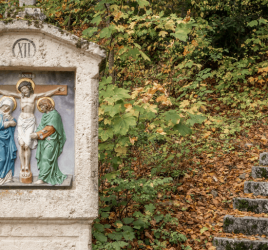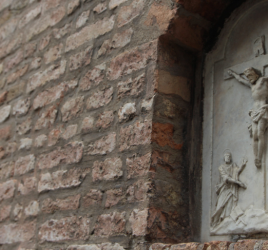
Interior Struggle | A Palm Sunday Homily by St. Josemaria Escriva
Like every Christian celebration, today’s is one of peace. The palm branches, with their ancient symbolism, recall a scene of the book of Genesis: “After waiting seven more days, Noah again sent out the dove from the ark. In the evening, the dove came back to him and there was a new olive branch in its beak. So Noah realized that the waters were receding from, the earth.”
Today we remember that the alliance between God and his people is confirmed and established in Christ, for “he is our peace.” In the liturgy of our holy catholic Church — which so wonderfully unites and sums up the old in the new — we read today the joyful words which remind us of how Jesus was greeted at his birth in Bethlehem: “The sons of the Hebrews, raising olive branches, went out to meet the Lord, crying out, Glory in high heaven.” As he moved off, St Luke tells us, “people spread their cloaks in the road, and now, as he was approaching the downward slope of the Mount of Olives, the whole group of disciples joyfully began to praise God at the top of their voices for all the miracles they had seen. They cried out: Blessed is the king who comes in the name of the Lord, peace in heaven and glory in the highest heaven.”
Peace in heaven. But let’s take a look at the earth. Why is there no peace in the world? That’s right, there is no peace, only a certain appearance of peace: a balance created by fear and precarious compromises. There is no peace even in the Church. It is rent by tensions which tear the white robe of the Spouse of Christ. And there is no peace in many hearts which vainly strive to make up for their intranquility of soul by continuous activity, by seeking a thin satisfaction in things which do not fill them but only leave a bitter aftertaste of sorrow.
“The palm leaves,” writes St Augustine, “symbolise homage, for they stand for victory. Our Lord is on the point of conquering by dying on the cross. Under the sign of the cross, he is about to triumph over the devil, the prince of death.” Christ is our peace because he is the victor. He has won the victory because he has fought, in a hard struggle, against the accumulated evil of human hearts.
Christ, who is our peace, is also the way. If we seek peace we have to follow his footsteps. Peace is a consequence of war, of struggle, of the intimate ascetical struggle which each Christian must keep up against everything in his life which does not belong to God. He is called to overcome pride, sensuality, selfishness, superficiality and meanness of heart. It is useless to call for exterior calm if there is no calm in men’s consciences, in the centre of their souls, for “from the heart come evil intentions: murder, adultery, fornication, theft, perjury, slander.”
But is not this rather an old-fashioned way of talking? Has it not been replaced by a more contemporary language, a language which cloaks personal defects in pseudo-scientific terms? Surely people tacitly agree that the really valuable things are money which buys everything; influence; shrewdness which leaves you always on top; human maturity which defines itself as “adult,” thinking it has outgrown the sacred?
I am not and never have been a pessimist, for the faith teaches me that Christ has conquered once and for all. He has given us, as a pledge of his victory, a commandment which is also a commitment: “Fight.” We Christians have a commitment of love to the calling of divine grace, which we have freely accepted, an obligation which urges us to fight tenaciously. We know that we are as weak as other men, but we cannot forget that if we use the means available to us, we will become salt and light and leaven of the world; we will be the consolation of God. Our determination to persevere in this resolution of Love is, moreover, an obligation of justice. This obligation — common to all Christians — implies a constant battle. The entire tradition of the Church has described Christians as milites Christi: soldiers of Christ. Soldiers who bring serenity to others while continually fighting against their own bad inclinations. Sometimes because we are short on supernatural outlook, in effect short on faith, we do not want to hear any talk of life on earth as a kind of war. We maliciously insinuate that if we think of ourselves as milites Christi, there is a danger that we might use the faith for earthly purposes, bringing pressure to bear, creating little isolated groups. This very naive line of thought is completely illogical and usually goes hand in hand with cowardice and love of comfort.
There is nothing further from the christian faith than fanaticism — that unholy alliance of the sacred and the profane, whatever guise it takes. That danger just does not exist if we understand our struggle as Christ has taught us to: as a war each of us makes on himself. It is a constantly renewed effort to love God better, to root out selfishness, to serve all men. Turning your back on this conflict, no matter what the excuse, means surrendering before you have begun to fight. Anyone who does so is brought low, without faith, depressed in his heart, blown this way and that by miserable pleasures.
Our spiritual combat in the presence of God and of all our brothers in the faith is a necessary result of being a Christian. So if you do not fight, you are betraying Jesus Christ and the whole Church, his mystical body
A Christian’s struggle must be unceasing, for interior life consists in beginning and beginning again. This prevents us from proudly thinking that we are perfect already. It is inevitable that we should meet difficulties on our way. If we did not come up against obstacles, we would not be creatures of flesh and blood. We will always have passions which pull us downwards; we will always have to defend ourselves against more or less self-defeating urges.
We should not be surprised to find, in our body and soul, the needle of pride, sensuality, envy, laziness and the desire to dominate others. This is a fact of life, proven by our personal experience. It is the point of departure and the normal context for winning in this intimate sport, this race toward our Father’s house. St Paul says: “That is how I run, intent on winning; that is how I fight, not beating the air. I treat my body hard and make it obey me for, having preached to others, I do not want to be disqualified.”
To begin or sustain this conflict a Christian should not wait for external signs or nice inner feelings. Interior life does not consist in feelings but in divine grace, willingness and love. All the disciples were quite capable of following Christ on the day of his triumph in Jerusalem, but almost all of them left him at the shameful hour of the cross.
If you are really going to love, you have to be strong and loyal; your heart has to be firmly anchored in faith, hope and charity. Only people who are inconstant and superficial change the object of their love from one day to the next: that’s not love at all, it’s the pursuit of selfishness. When love exists there is a kind of wholeness — a capacity for self-giving, sacrifice and renunciation. In the midst of that self-denial, along with painful difficulties, we find joy and happiness, a joy which nothing and no one can take away from us.
In this adventure of love we should not be depressed by our falls, not even by serious falls, if we go to God in the sacrament of penance contrite and resolved to improve. A Christian is not a neurotic collector of good behaviour reports. Jesus Christ our Lord was moved as much by Peter’s repentance after his fall as by John’s innocence and faithfulness. Jesus understands our weakness and draw us to himself on an inclined plane. He wants us to make an effort to climb a little each day. He seeks us out, just as he did the disciples of Emmaus, whom he went out to meet. He sought Thomas, showed himself to him and made him touch with his fingers the open wounds in his hands and side. Jesus Christ is always waiting for us to return to him; he knows our weakness.
“Interior Struggle” is a homily given by St. Josemaria Escriva on April 4, 1971. The homily is published by Scepter Publishers in the book “Christ is Passing By.”




